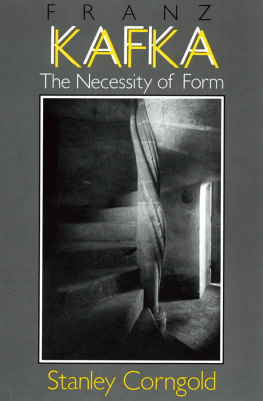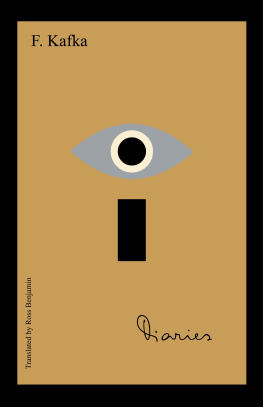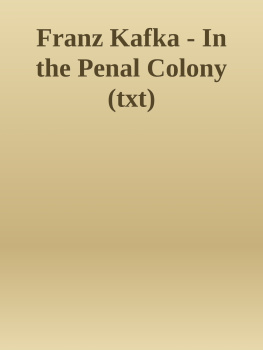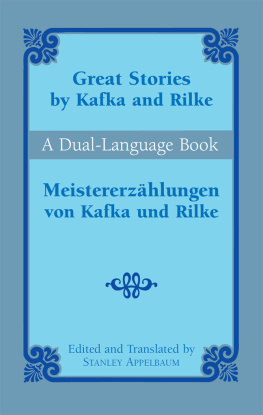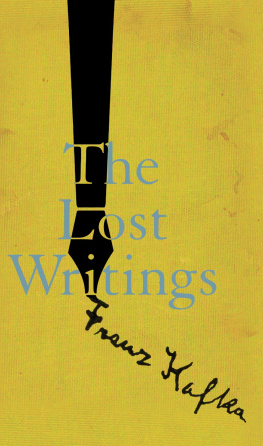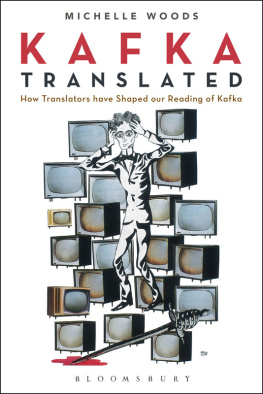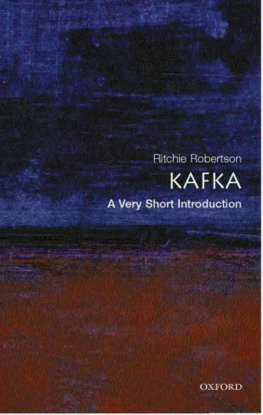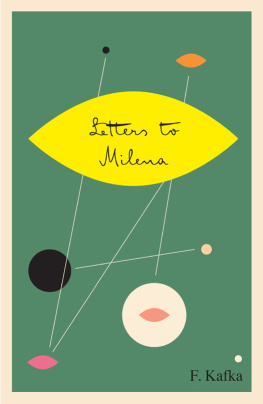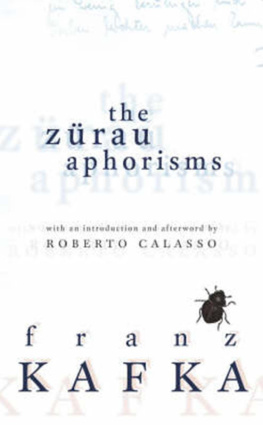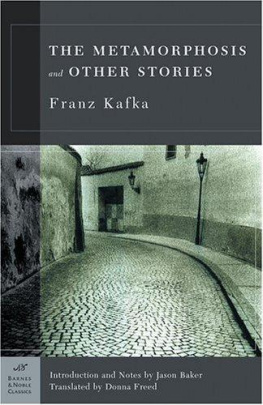Stanley Corngold - Franz Kafka
Here you can read online Stanley Corngold - Franz Kafka full text of the book (entire story) in english for free. Download pdf and epub, get meaning, cover and reviews about this ebook. year: 2017, publisher: CORNELL UNIVERSITY PRESS, genre: Detective and thriller. Description of the work, (preface) as well as reviews are available. Best literature library LitArk.com created for fans of good reading and offers a wide selection of genres:
Romance novel
Science fiction
Adventure
Detective
Science
History
Home and family
Prose
Art
Politics
Computer
Non-fiction
Religion
Business
Children
Humor
Choose a favorite category and find really read worthwhile books. Enjoy immersion in the world of imagination, feel the emotions of the characters or learn something new for yourself, make an fascinating discovery.
- Book:Franz Kafka
- Author:
- Publisher:CORNELL UNIVERSITY PRESS
- Genre:
- Year:2017
- Rating:4 / 5
- Favourites:Add to favourites
- Your mark:
- 80
- 1
- 2
- 3
- 4
- 5
Franz Kafka: summary, description and annotation
We offer to read an annotation, description, summary or preface (depends on what the author of the book "Franz Kafka" wrote himself). If you haven't found the necessary information about the book — write in the comments, we will try to find it.
Franz Kafka — read online for free the complete book (whole text) full work
Below is the text of the book, divided by pages. System saving the place of the last page read, allows you to conveniently read the book "Franz Kafka" online for free, without having to search again every time where you left off. Put a bookmark, and you can go to the page where you finished reading at any time.
Font size:
Interval:
Bookmark:

My whole being is directed toward literature; I have followed this direction unswervingly... , and the moment I abandon it I cease to live. Everything I am, and am not, is a result.... It is the earthly reflection of a higher necessity.
F RANZ K AFKA , Letters to Felice (1913)
From the West all content acquires meaning from form only, ones gaze is fixed only on form, courtesy of Flaubert.... It became the feature of apocalypse: the task of reality pure and simple, the transposition of all substance into form, into the formula.
G OTTFRIED B ENN , Zchtung I
He does not live for the sake of his personal life; he does not think for the sake of his personal thoughts. It seems to him that he lives and thinks under the compulsion of a family, which, it is true, is itself superabundant in life and thought, but for which he constitutes, in obedience to some law unknown to him, a formal necessity.
F RANZ K AFKA , The Great Wall of China (1920)
To say what Kafkas work means is to say more than one can, if meanings depend on descriptions of experience, having beginnings and ends. For here, in Hlderlins words, beginning and end no longer allow themselves to be coupled together like rhymes. The power of Kafkas work consists in the many ways it suggests that literature can function without meaningthat is, without provoking substitutions or analogies that appeal to the beginnings and ends of experience. Kafkas works are the signs of a body in labor; signs of a consciousness needing to be; signs, above all, of the being who is literature, seeking through language the ecstatic consumption of experience.
These relations can be put into concepts and ideas, and certainly powerful formulas are found in Kafkas notebooks, in which writing is defined as a form of prayer (DF 312) and literature as an assault on the last earthly frontier (DII 202). But all such gnomes leave an irreducible remainder of startling images, suggesting that they are fragments torn from only a dream of textbook poetics. Critics redescriptions of these relations tend to be derivative, flattened-out stories of the way Kafkas writing arose and mattered for him. His work is the braille of a being that loads the rifts beneath its runes. Kafkas sense of the continuity of poetic desire and writing is at once the ink relation of script and the blood relation of birth, and thus he acknowledged all of his live, published works in a story called Eleven Sons. What is at stake for him is not encoding meanings in fiction but, simply put, writinghis last word. He writes as one who must write, whose works enact the craving for a final breath: There is no having, only a being, only a state of being that craves the last breath, craves suffocation (DF 37).
The animation of Kafkas writing self proceeds from a great depth, whence it is guided above ground into an incredible spate of new things (GW 263). devices of literary rhetoric, which in the past have been avoided by historians, since they pose special difficulties to interpretation. Kafkas distinctive tropes and strategies, such as metamorphosed metaphors and monopolized narrative style, appear to affirm the power to excite interpretation as the warrant of literature at the same time that they prevent this activity from reaching a conclusion. Indeed, wrote Kafka, his works are scarcely tolerable, incapable of becoming history (GW 26364). In this book, however, I try to show that Kafkas rhetoric can be recovered as the enactment of the project of one who had to live his life as literature, in works bearing witness to this fate.
In modern literature the threat to meaning and its overcoming have a history of their own, which Kafkas literary past helps to define. The tradition of Kafka takes readers to Cervantes, Flaubert, and Nietzsche as writers who provoke a comparable disruption by such narrative strategies as framed narration and veiled discourse, as well as by themes related to Kafkas own: the phenomenon of unwilled self-reversal, consternation between persons, the difficulty of conceiving of an individual life as rounding to a close.
The first part of this book deals with a few short works in which the basic figures of Kafkas thought and composition can be found most clearlyfigures prominently informed by principles of resemblance and difference in a state of high tension. These are chiefly the tropes of metaphor and symbol on the one hand, allegorical allusion on the other. Their principles shape, moreover, the kinds of criticism that Kafkas works have attracted. This is to say, the works themselves construct, dramatize, and reject principles generating types of interpretation.
and issues discussed in the first part of the book, with the intention of giving them new emphasis from context. Thus, Kafka, Nietzsche, and the Question of Literary History (Chapter Six) takes up the matter of Kafkas Double Helix (Chapter Five); Consternation: The Anthropological Moment in Prose Fiction (Cervantes, Flaubert, Kafka) (Chapter Seven) takes up The Hermeneutic of The Judgment (Chapter Two); and The Curtain Half Drawn: Prereading in Flaubert and Kafka (Chapter Eight) takes up the The Trial/ In The Penal Colony: The Rigors of Writing, which for reasons of continuity actually follows as Chapter Nine. An Excursus considers the relation of these chapters and concerns to the institution of Kafka studies.
This book itself generates a relation between two approaches to Kafkas work. On the one hand it proposes, as a necessary but insufficient condition of reading, Kafkas intelligibilityhis symbolic images, his experiences of thought, the narrative of a life, a developing discoursein individual works and in Kafkas career as a whole. On the other hand it lingers on Kafkas characteristic figures, the constituents of his rhetorical imaginationsuch as metamorphosed metaphors, fictive perspectives, and chiastic reversalsconsidering always the disruptive bearing, on the usual tale of a tale told, that such figures have. What effect, in other words, do Kafkas rhetorical decisions have on the readers desire to read Kafkas work as an intelligible whole, modeled on a life story?
The outcome is not, and should not be, a single field or principle. Kafka described, typically, his attempts to write as seeking that freedom of true description which releases ones foot from experience [die einem den Fu vom Erlebnis lst] (DI 100; Ta 104), but Gustav Janouch also records Kafka as asking, The material must be worked on by the spirit [before it can develop into eternal art]? What does that mean? It means to experience, nothing else except to experience and to master what is experienced. That is what matters (J 159). It therefore comes as no surprise that for Kafka the point of view of art and that of life are different even in the artist himself (DF 86)a difference that I understand as itself varying. My chapters make various attempts to define the main modes of this relation, stressing on the one hand the sheer disparateness of art from human life and the deadly estrangement which that difference required Kafka to live, and I try to reflect some of this variety within Kafkas continual thought about literature.
This book is rather parsimonious in the number of works of Kafka treated. That is because its choice of texts is determined by my previous work on Kafkas early stories and aphorismswork done originally from the desire to begin at the beginning and to which I return in the hope of getting a better grasp. I have decided, however, not to add on many new chapters in the name of an unattainable comprehensiveness. Work done a long time ago promises the unity of whatever belongs to the past. Equally, in bringing older and newer essays together, I can generate something they never displayed in the past: namely, a common perspectiveone which, I realize, has needed a good deal of rewriting to achieve. While doing this I I have finally decided to let them stand. There are too many advantages in doing so.
Next pageFont size:
Interval:
Bookmark:
Similar books «Franz Kafka»
Look at similar books to Franz Kafka. We have selected literature similar in name and meaning in the hope of providing readers with more options to find new, interesting, not yet read works.
Discussion, reviews of the book Franz Kafka and just readers' own opinions. Leave your comments, write what you think about the work, its meaning or the main characters. Specify what exactly you liked and what you didn't like, and why you think so.

